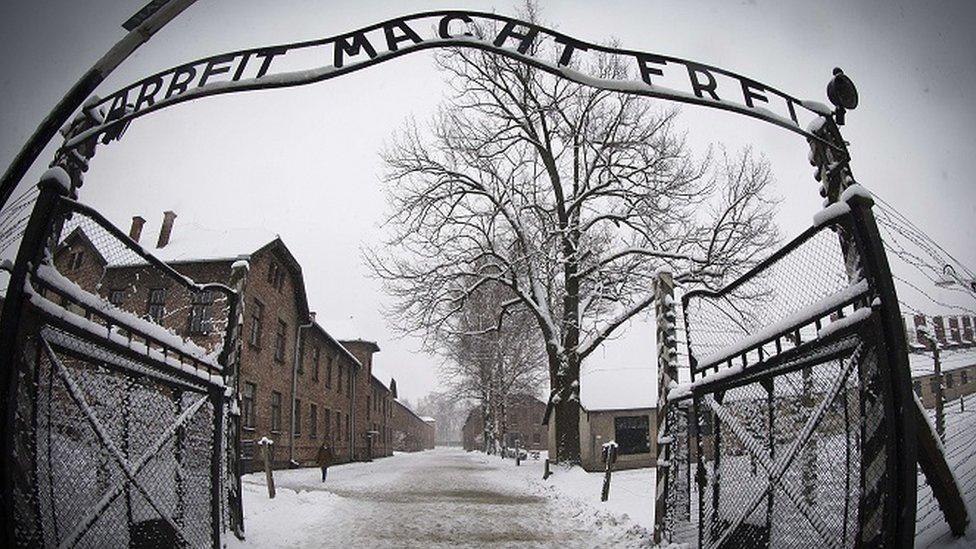Ukraine's Great Famine memories fuel resentment of Kremlin
- Published
Watch: Two Ukrainians recall the devastation of the Great Famine
Resentment of Moscow in Ukraine has deep historical roots. In the Great Famine of the 1930s, as many as four million Ukrainians died during the forced collectivisation of farms by Soviet dictator Joseph Stalin. The BBC's Fergal Keane has been to the eastern city of Kharkiv, close to the Russian border, and met some of the last survivors of the famine.
They rushed to bolt the door and lock the windows of the little wooden house. It trembled from the battering of the men outside. Petro Mohalat, now aged 95, remembers the first food raids in the winter of 1932.
He was five years old when the communist "brigade" arrived in the village. His grandmother told the children to hide anywhere they could.
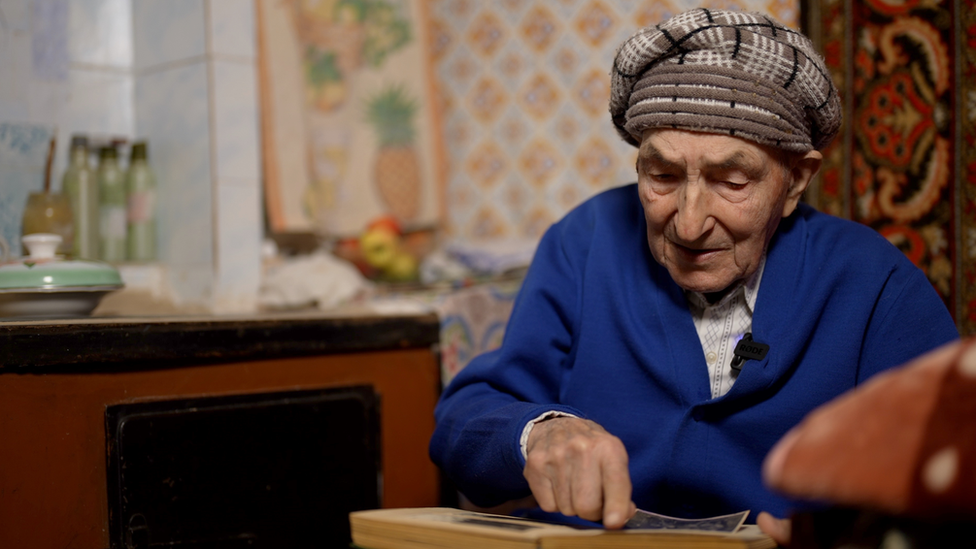
Petro Mohalat says his father had to give everything to the collective farm - their cow, horse, even a bucket
"It was very scary. The brigade had pitchforks and they came to every house searching for bread," he recalls. "They used crowbars to come inside. Then they went to all the barns trying to find any buried bread."
Acting on the orders of Stalin, Communist officials seized food and prevented peasants from leaving their villages to search for supplies. They were being punished for resisting the forced collectivisation of farms.
Ukraine calls the deaths of an estimated four million people in the famine of 1932-33 the Holodomor - killing by starvation.
Now, amid fears of a Russian invasion, memories of what Ukrainians suffered at the hands of the Kremlin fuel resentment of Moscow.
"My father had to give everything to the collective farm - our cow, horse, even our bucket. My mother was very angry," says Mr Mohalat.
He lives in a cottage near the village of Kovyyhi, about 60km (37 miles) from the Russian border, along a narrow path thick with snowdrifts where the fields darken as the light falls. To the remaining survivors of the famine, this is a landscape of ghosts.
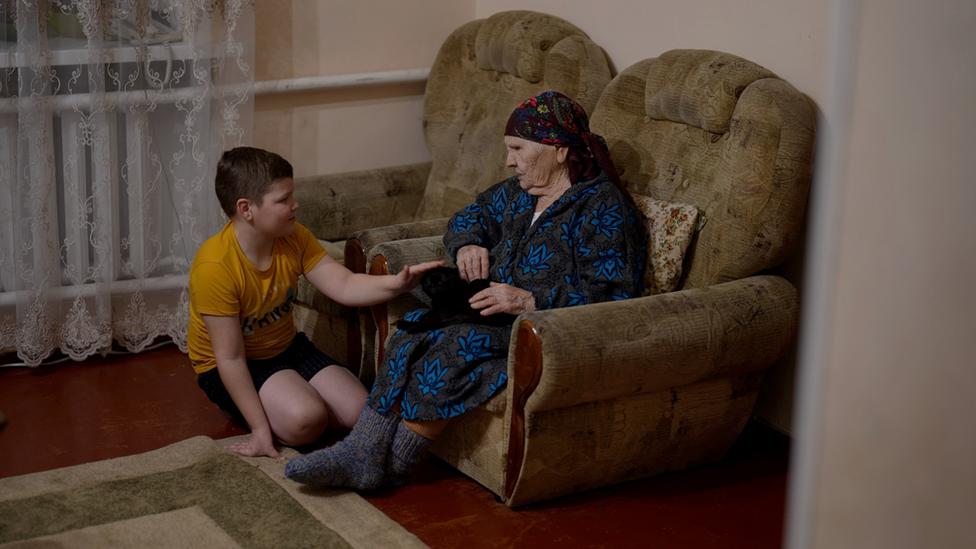
Remembering the horror of the famine, Oleksandra Zaharova feels a responsibility to pass on what she remembers
Oleksandra Zaharova, aged 98, remembers the constant hunger, the desperate search for food, and the faces of the dead.
"What could I see?" she asks. "I saw people who died. They made a big pit and threw all the bodies there."
Her father managed to get away and travelled to western Ukraine, taking the family's remaining valuables to try and exchange them for food.
"But he got nothing," she says. "We lost everything."
Oleksandra's great-grandson, Dmytro, who grew up hearing her stories of the Holodomor, has served with the Ukrainian army in the east of the country. He is now with his unit, preparing to defend the country in the event of an invasion.
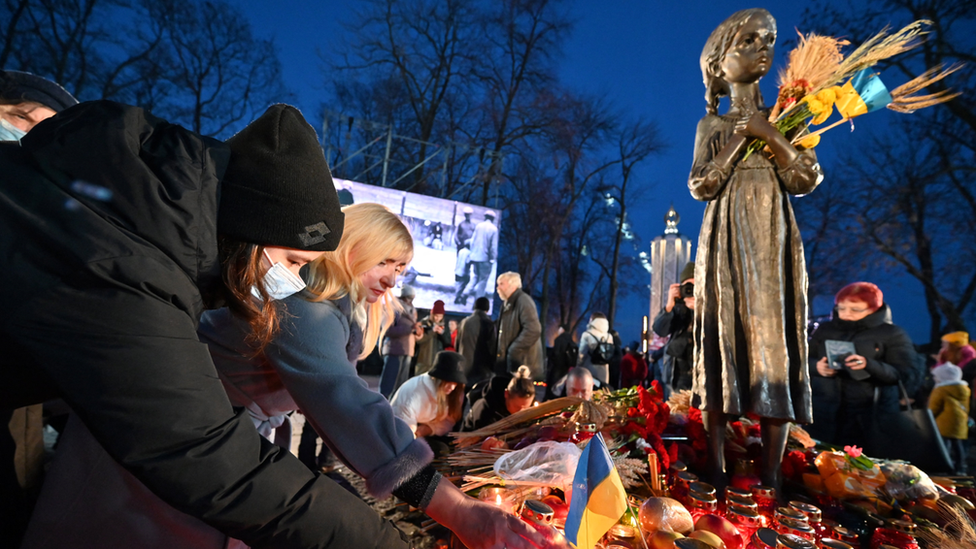
Every November, Ukrainians around the world light candles to remember those who perished in the Holodomor
Although other parts of the former Soviet Union also suffered from Stalin's ruinous agricultural policies and savage repression, the loss of life in Ukraine was the greatest.
Russia denies that Ukrainians were politically targeted for starvation because Joseph Stalin feared nationalist sentiment. Just over a decade before they had fought to establish an independent nation - but were defeated by the Red Army.
It says much for official attitudes that Russia's Supreme Court recently ordered the closure of Memorial, Russia's oldest NGO devoted to uncovering Soviet-era oppression.
The group was accused of portraying the USSR as a "terrorist" state instead of taking "pride in our glorious past".
In the dark, chilly basement of Kyiv's Institute of National Memory, the past hovers in the shadows. This is where prisoners disappeared, among them many arrested during the persecution that accompanied the famine.
I had gone to visit the institute's director, Dr Anton Drobovych, when he told me the building had once housed the secret police. His own grandfather was murdered by Stalin's regime.
Illuminated only by the light of our mobile phones, we walked along narrow passageways, past the network of secret cells through which thousands passed on their way to torture and death.
Dr Drobovych is keen to point out that responsibility for the horrors of that period doesn't lie with Stalin alone. The repression and the forced collectivisation could not have happened without the participation of vast numbers of Ukrainian Communist officials.
He sees in modern day Russia's attempts to impose its will on Ukraine worrying echoes of the Soviet past.
"They protect Stalin, they hide truth, they attack us. They don't recognise us as an independent country, why? We don't understand why."
As all nations know, memory is a powerful weapon. The story of the Holodomor is central to Ukraine's idea of itself as a country that defies Russian domination.
Remembering the horror of the famine, Oleksandra Zaharova feels a responsibility to pass on what she remembers.
But when I ask if after surviving the Holodomor she was able to have a good life, she tells of how two of her children died in a later famine. Yes she survived, but it was not a life that anybody would want to have lived.
Nina Karpenko: "I remember bodies being swollen by hunger"
Related topics
- Published12 February 2022
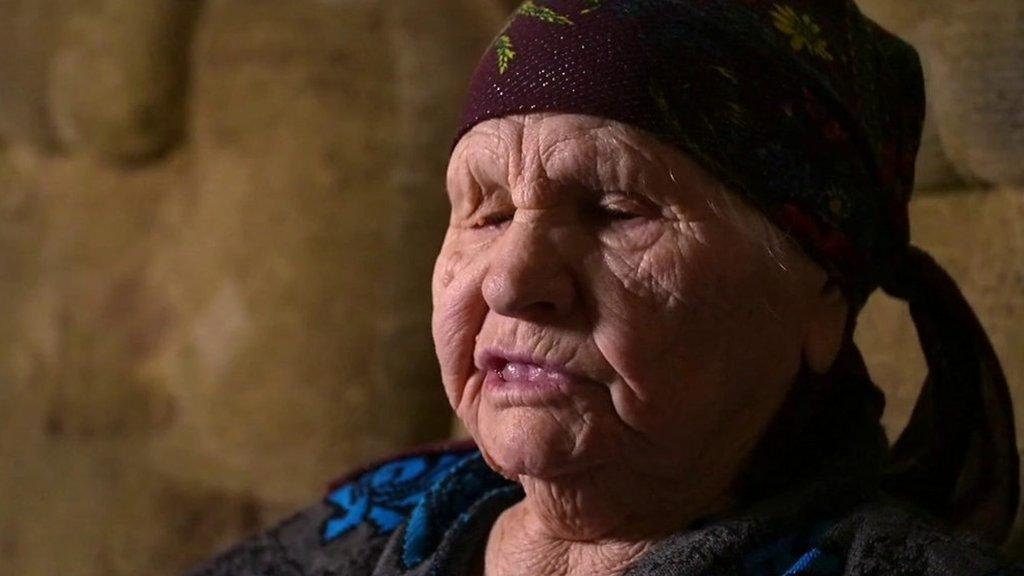
- Published23 November 2013
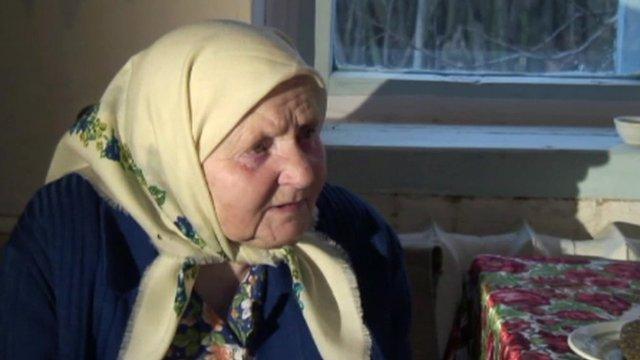
- Published23 November 2013
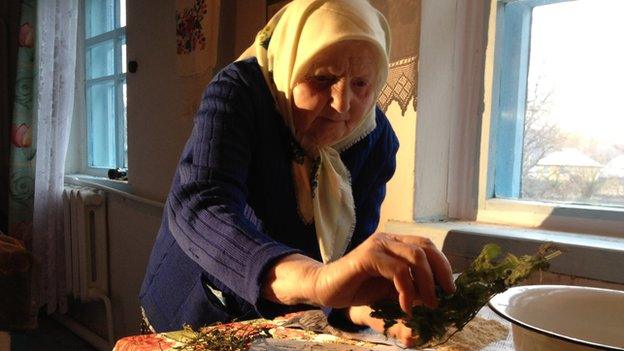
- Published4 April 2022
